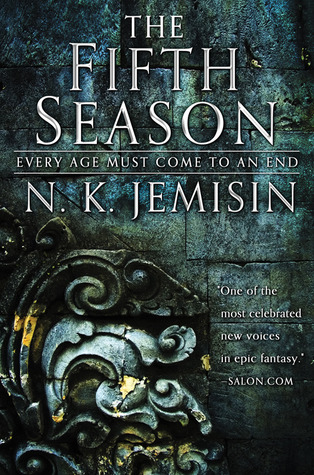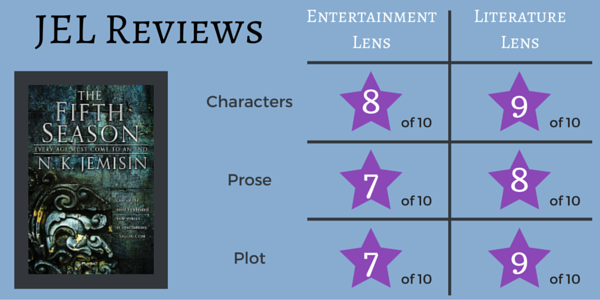Paul and I joined the Fantasy Book Club at Tubby & Coo’s, forcing me to be a better human and read at least one fantasy book a month. To capitalize on that opportunity, I’ll be writing reviews of each book as we go!
Be warned: I’m a forgiving reviewer. When you come here, you will not find me eviscerating novels. I’ll point out what I liked and what I didn’t like, and I’ll root everything in what it is—my opinion—rather than some self-ordained concept of what is “good” and “bad.”
I also plan to break each review into two sections: one for those who haven’t read the book, and one for those who have read the book. And I’ll rate (1) characters, (2) prose, and (3) plot through two lenses—entertainment and literature. (Basically, how I felt about it while I was reading, and how I felt about it when I thought about what I was reading.)
That being said, on to #JELReviews!
Be warned: I’m a forgiving reviewer. When you come here, you will not find me eviscerating novels. I’ll point out what I liked and what I didn’t like, and I’ll root everything in what it is—my opinion—rather than some self-ordained concept of what is “good” and “bad.”
I also plan to break each review into two sections: one for those who haven’t read the book, and one for those who have read the book. And I’ll rate (1) characters, (2) prose, and (3) plot through two lenses—entertainment and literature. (Basically, how I felt about it while I was reading, and how I felt about it when I thought about what I was reading.)
That being said, on to #JELReviews!
For those who haven't read the book:
| Halfway through reading The Fifth Season, I remembered that I’d have to review the book once I finished. I panicked. I panicked, because I loved the book too much already. And when I love something this completely, I find myself with less to say than when something lends itself to criticism. N. K. Jemisin’s glorious, fat book is the start of what I hope will be a glorious, fat trilogy. Book #2, The Obelisk Gate, arrives in August—but I’d advise against investigating it or its description until you’ve read The Fifth Season. Discussing this book without spoilers will prove challenging, but I’ll do my best. |
The Fifth Season can be hard to start. The narrative unfolds through a few different voices, one of which is told in the second-person. I’ve been told that the second-person narrative can be especially challenging, though it didn’t present any problems for me. The reader is dropped into a new world without directions—Jemisin dumbs down nothing. She uses the vocabulary of her people, of her invented world, and the reader should eventually understand the caste system, sciences, and traditions through context clues.
This is a world of earthquakes. A world in which society constructs itself around the concept of survival, clinging to age-old instruction manuals and myths called “stonelore.” Every chapter of The Fifth Season ends with a snippet of stonelore that sheds light on the society and supplements the chapter.
This is a world of oppression. Some of its people can wield, control, and halt earthquakes, and the Stills (Jemisin’s equivalent of muggles without power) fear these earth-tuned “orogenes.” They fear them, they hunt them, and they manipulate and dehumanize them.
The book is dedicated thusly: “For all those who have to fight for the respect that everyone else is given without question.”
Our main characters are within that group. And Jemisin’s entire cast acknowledges diversity not often seen in fantasy novels: gay characters, transgender characters, polyamorous characters, characters of all races, characters of all classes. We see sex-positive messages, we see empowering messages, we see what our society might call “nonstandard” relationships, but Jemisin and her characters never preach or moralize. The narrative, the tone, and the characters naturalize and normalize everything that should be naturalized and normalized.
With a deft hand, Jemisin showcases the cruelty of racism and oppression without perpetuating the same standards from our own society.
Jemisin does smart things with her structure and with her sentences. Smart things, cool things, interesting things, technically skilled and fascinating things.
This is a dark book. This is a realistic fantasy. It pulls no punches, it gets violent, and I’d feel comfortable calling it fantasy-horror at points.
This is a world of earthquakes. A world in which society constructs itself around the concept of survival, clinging to age-old instruction manuals and myths called “stonelore.” Every chapter of The Fifth Season ends with a snippet of stonelore that sheds light on the society and supplements the chapter.
This is a world of oppression. Some of its people can wield, control, and halt earthquakes, and the Stills (Jemisin’s equivalent of muggles without power) fear these earth-tuned “orogenes.” They fear them, they hunt them, and they manipulate and dehumanize them.
The book is dedicated thusly: “For all those who have to fight for the respect that everyone else is given without question.”
Our main characters are within that group. And Jemisin’s entire cast acknowledges diversity not often seen in fantasy novels: gay characters, transgender characters, polyamorous characters, characters of all races, characters of all classes. We see sex-positive messages, we see empowering messages, we see what our society might call “nonstandard” relationships, but Jemisin and her characters never preach or moralize. The narrative, the tone, and the characters naturalize and normalize everything that should be naturalized and normalized.
With a deft hand, Jemisin showcases the cruelty of racism and oppression without perpetuating the same standards from our own society.
Jemisin does smart things with her structure and with her sentences. Smart things, cool things, interesting things, technically skilled and fascinating things.
This is a dark book. This is a realistic fantasy. It pulls no punches, it gets violent, and I’d feel comfortable calling it fantasy-horror at points.
Perhaps you think it wrong that I dwell so much on the horrors, the pain, but pain is what shapes us, after all. We are creatures born of heat and pressure and grinding, ceaseless movement. To be still is to be . . . not alive.
Read the book. Please, read the book. It’s important. It’s one of the most refreshing, horrifying, technically impressive books I’ve read.
I’d not only recommend it—I’d recommend it ahead of most other books.
I’d not only recommend it—I’d recommend it ahead of most other books.
For those who have read the book:
Spoilers ahead!
(Seriously, more than normal. Go away to avoid spoilers.)
I love this book.
I love the way this book presents us with one character’s entire lifetime without forcing readers to slog through a chronological progression of that lifetime. I love the way this book makes each time period in Damaya/Syen/Essun’s life feel like its own, interesting story. I love the way this book highlights that we are different people at different points in our lives.
I love the way this book tricked me into thinking the prologue/interlude narrative voice is “author”/“Jemisin,” and I love that it turns out to be the voice of character Hoa. And I love how much more meaning certain sentences take when you re-read them, remembering that it’s Hoa speaking. (For instance, the line that I quoted farther up.)
I absolutely love the way the text breaks when Syen is forced to kill her first child.
(Seriously, more than normal. Go away to avoid spoilers.)
I love this book.
I love the way this book presents us with one character’s entire lifetime without forcing readers to slog through a chronological progression of that lifetime. I love the way this book makes each time period in Damaya/Syen/Essun’s life feel like its own, interesting story. I love the way this book highlights that we are different people at different points in our lives.
I love the way this book tricked me into thinking the prologue/interlude narrative voice is “author”/“Jemisin,” and I love that it turns out to be the voice of character Hoa. And I love how much more meaning certain sentences take when you re-read them, remembering that it’s Hoa speaking. (For instance, the line that I quoted farther up.)
I absolutely love the way the text breaks when Syen is forced to kill her first child.
There are moments when everything changes, you understand.
I love how much all these deaths hurt. I love that the death of a son frames the beginning and the end of the novel.
I love that the all-powerful Alabaster is the weakest, emotionally. I love how tangibly, how concretely, how vividly I see and understand Syenite. I can reach out and touch her and Alabaster in my mind because of how completely Jemisin crafted them for us.
I love Schaffa, who may be one of my favorite villains. He terrifies me in a way that villains rarely scare me. I can just imagine his smile, his domestic-abuse-level “love,” I can hear his soft voice gently warning me to be brave while he breaks my hand, pleading quietly for me to work harder so he won’t have to be burdened with killing me. I want to know about his childhood. I want to know how he came to be. I want to know about the implant process and why the implants glitch and why all the Guardians have this eerie grin, and I want to know what they’re fighting for.
I love that I only have to wait until August to read the next book.
I love that the all-powerful Alabaster is the weakest, emotionally. I love how tangibly, how concretely, how vividly I see and understand Syenite. I can reach out and touch her and Alabaster in my mind because of how completely Jemisin crafted them for us.
I love Schaffa, who may be one of my favorite villains. He terrifies me in a way that villains rarely scare me. I can just imagine his smile, his domestic-abuse-level “love,” I can hear his soft voice gently warning me to be brave while he breaks my hand, pleading quietly for me to work harder so he won’t have to be burdened with killing me. I want to know about his childhood. I want to know how he came to be. I want to know about the implant process and why the implants glitch and why all the Guardians have this eerie grin, and I want to know what they’re fighting for.
I love that I only have to wait until August to read the next book.
Overall, The Fifth Season is not just a good book, or a great book, or a masterfully written book, or an entertaining book. It’s important. It’s genre-stretching. It’s the next thing you should read.



 RSS Feed
RSS Feed


